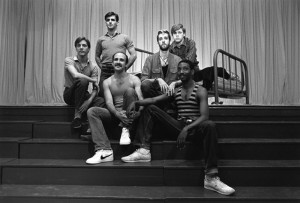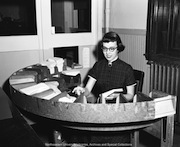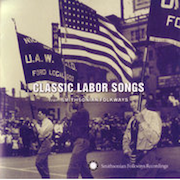NU Athletics: If you can play, you can play.
In partnership with the organization You Can Play, Northeastern University Athletics has recently recorded a PSA supporting equality in sports. Northeastern student- athletes, coaches, administrators,and fans came together to express their support for lesbian, gay, bisexual and transgender athletes, promoting their message that sexual orientation has no bearing in sport: if you can play, you can play. In their partnership with You Can Play, NU Athletics is been committed to creating an open, inclusive and supporting culture at Northeastern for LGBT athletes and students.
Supporting the LGBT community at Northeastern more broadly,the Library’s Archives and Special Collections Department highlights LGBT groups as part of the social justice collection strategy. Community members can view collections from organizations such as:
- The Bromfield Street Educational Foundation, which published The Gay Community News, considered one of the oldest and most progressive newspapers in the gay community from 1973 to 1999;
- The Lesbian, Gay, Bisexual and Transgender Political Alliance of Massachusetts, a community action group that serves the interests of the gay, lesbian, bisexual, and transgender community; and from many more organizations and supporters of the LGBT community.

 [Update] On June 3rd, the petition supporters reached their goal of 25,000 signatures!
This year, the Obama administration has been actively considering the issue of public access to the results of federally funded research. The administration is currently considering which policy actions are priorities that will it will act on before the 2012 presidential election season begins in earnest. Supporters of open access to research results hope to demonstrate a strong public interest in expanding the
[Update] On June 3rd, the petition supporters reached their goal of 25,000 signatures!
This year, the Obama administration has been actively considering the issue of public access to the results of federally funded research. The administration is currently considering which policy actions are priorities that will it will act on before the 2012 presidential election season begins in earnest. Supporters of open access to research results hope to demonstrate a strong public interest in expanding the 

 Over the past few weeks we have been administering a survey in order to collect information on what Library users need and want more of in terms of study space. The survey asked users questions about where they like to study and what type of spaces should the Library have more of, allowing the Library to learn what users really want for their library that will enable them to have their ideal study space. Users were able to take the survey online or on paper, which was handed out during different times of the day at the Library and other areas on campus, such as the Curry Student Center.
We’ve had a great response, reaching about 1,000 completed surveys, with respondents from all colleges and divisions of the University. A big Thank You to everyone who took the survey, in print or online! With all of your helpful responses, we have generated important information that will help shape the Library’s planning now, as well as its long term development.
Over the past few weeks we have been administering a survey in order to collect information on what Library users need and want more of in terms of study space. The survey asked users questions about where they like to study and what type of spaces should the Library have more of, allowing the Library to learn what users really want for their library that will enable them to have their ideal study space. Users were able to take the survey online or on paper, which was handed out during different times of the day at the Library and other areas on campus, such as the Curry Student Center.
We’ve had a great response, reaching about 1,000 completed surveys, with respondents from all colleges and divisions of the University. A big Thank You to everyone who took the survey, in print or online! With all of your helpful responses, we have generated important information that will help shape the Library’s planning now, as well as its long term development.